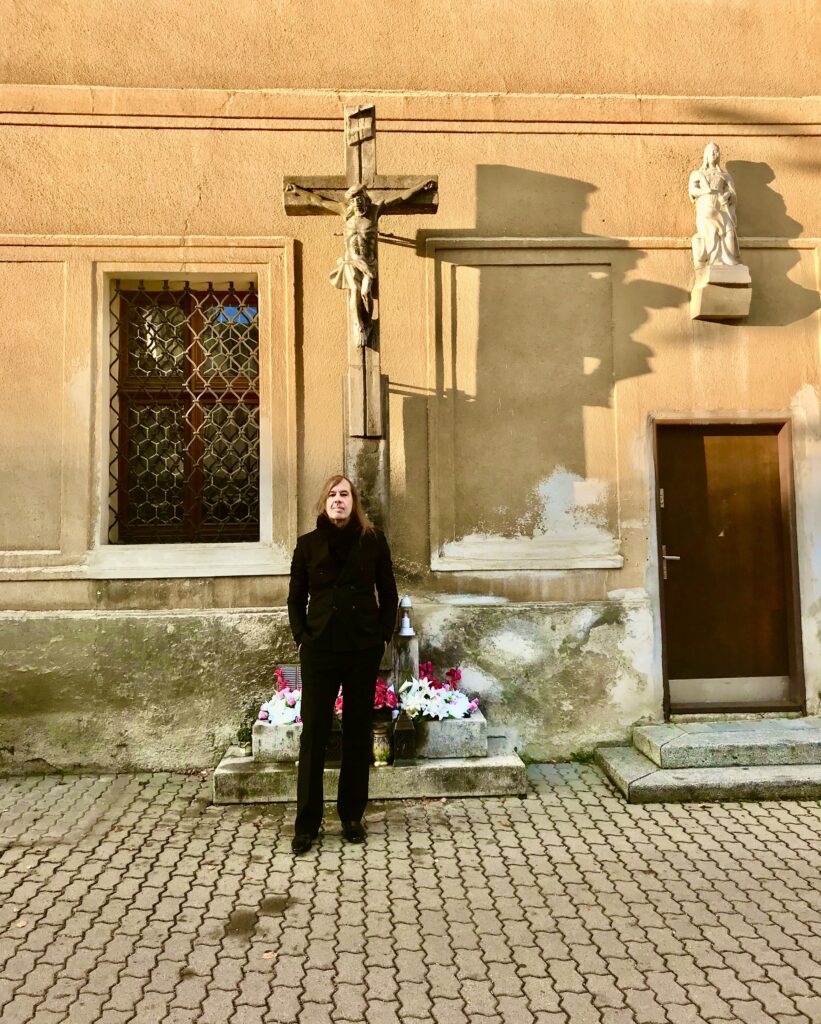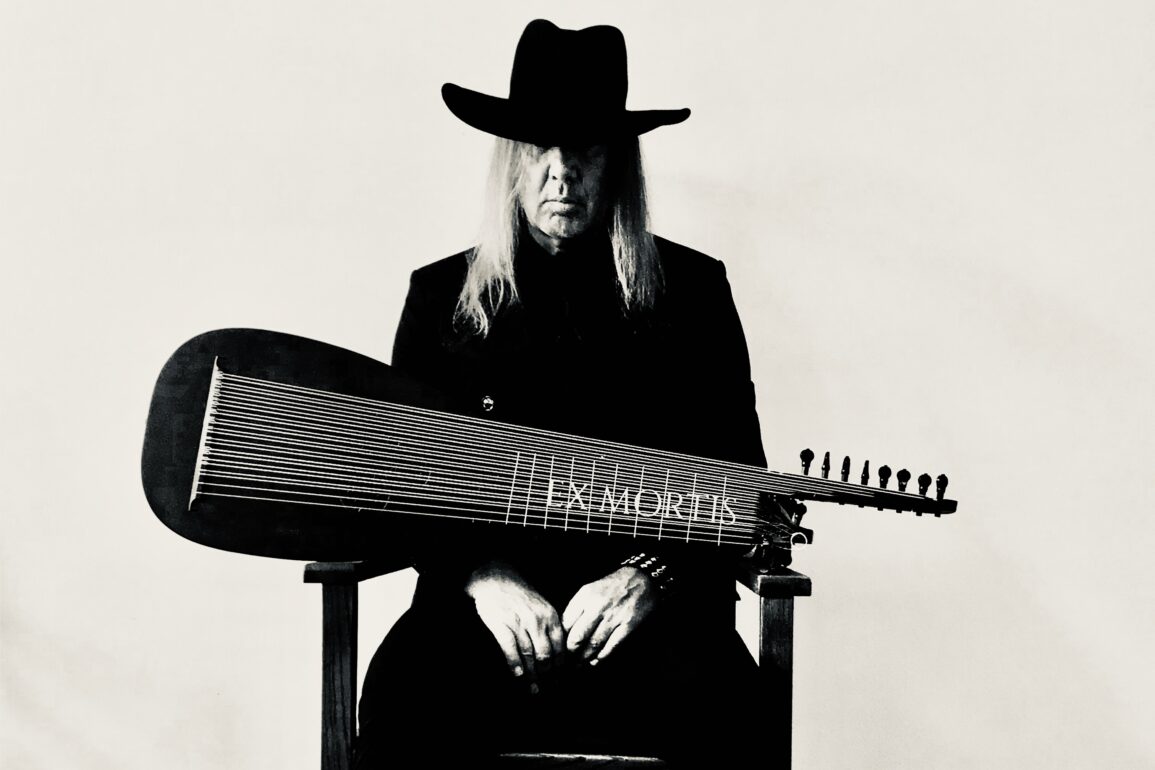The Dutch minimalist composer and lute player Jozef van Wissem is a critically-acclaimed artist widely known by his solo projects as well as his collaborations with director Jim Jarmusch. This Halloween season, van Wissem released Nosferatu. The Call Of The Deathbird, a rescoring of the classical silent horror film Nosferatu. We met van Wissem through Zoom, where we had a lovely and spiritual chat.
How are you doing these days?
I’m okay. I’m doing shows, so it’s a bit crazy. My record just came out, so I have been really busy. But it’s cool, Nosferatu. The Call Of The Deathbird seems to be really successful.
Obviously, your new album will be the center of our conversation. When your representative reached out to do this interview, I immediately felt compelled to make this happen, partly because I have a soft spot for Nosferatu. So let’s talk about how that whole process escalated and how it eventually resulted in this album.
I was commissioned by La Cinémathèque Française in Paris. They wanted me at the presentation of a restored copy of the film. There was a premiere of that restored version. I was a bit hesitant because I don’t get asked to do a lot of silent films. It’s such an industry. I like it more when I have an idea to do something, which I didn’t have when I started doing it. After a few screenings, though, that presentation proved to be very successful. The audiences were really into it. They showed the way to score the film. In the beginning, it was all improvised and reactive, which I don’t like. But after that, the audience introduced me to the idea that it was good to start with nothing and slowly build it up to a slow metal drone. I also found these bird sounds, which I used in the movie. Count Orlok is the bird of death. It says so in the film, there’s a letter that goes “the call of the deathbird,” which I thought was fascinating. So what I did was to use those bird sounds -manipulated through effects, of course.
You already have experience in film scores, but scoring music for a pre-existing silent film is something else. It contains a historical body of music work. Normally, you don’t see the film when you start composing its music. Is that habit the reason why you composed before seeing the film Nosferatu as well?
Yeah. As I said before, I don’t like the idea of reacting to images. I think the composer has their own storyline. You project that into the film. It’s not like you follow the movie or anything, I think you need to have your own story. This way it becomes a more layered work. I don’t feel like I need to answer to history or the music history of Nosferatu. If you look at the films from the 1920s, they all sound the same. The same effects, the same clapping sounds… It’s a really boring sound. I also don’t think that anyone should go, “Okay, let’s check this out. What is the historical soundtrack?” For Nosferatu, I think only a part of it survived, but I don’t see why I should use that. It’s 2022, it’s a hundred years later! Things have changed!

Now that this album is out, do you continue expanding on this music? Or do you consider yourself done with the idea of this art piece now?
With the instrument I use (the lute), it all depends on the room. I always say the concert is about the room than it is about the instrument. The acoustics of the room define if I play longer lutes or something else. So it still develops. The version of the record contains the pieces of it, while the movie is 90 minutes. I did actually put Acts 1 to 5 as they are in the German version. You can actually start playing an act when the act starts and then double it. But it’s not %100 fixed.
How much of a silent film enthusiast are you? If you were to pick another silent film to rescore, which one would it be?
I already picked it. It’s Fritz Lang’s Der müde Tod. (laughs) It’s from a similar period, but it’s a completely different type of film. I just recently saw that and picked it out, and I had been watching a lot of silent films. I love silent films. I immediately had my eyes fixed on this film when I saw it. It’s better for me when I have an idea for a film if I am to score it. I don’t really prefer somebody to ask me to do a film I’m not familiar with. I need to have an idea already of how to go about with the score. When I’m really enthusiastic, that’s when it becomes a real score. Music, for me, is more about ideas anyway, you know? It’s about short melodies that are really important. That’s more important than, let’s say, a thousand notes. I like to have one strong idea about the composition.
Let’s elaborate on that last part. Being a minimalist composer, do you ever feel inclined to listen to music on the opposite side? Do you ever listen to maximalist composers?
I don’t like maximalist composers. (both laugh)
That was a quick answer.
I’m really into good melodies. A simple melody is very difficult to write. One that you remember and sticks with you. That’s the secret of songwriting and composition to me. With great melodies, that’s what it’s all about. A maximalist project like an orchestra, I can’t stand it. I can’t stand orchestral soundtracks. I also can’t stand action movies, I’m very particular about that stuff. If somebody likes action movies or orchestral scores, let it be. It’s fine. But it’s not for me.
One of your frequent collaborators is Jim Jarmusch. You have made independent albums with him as well as film scores. When you two are in the same room, how do those two different types of albums differ in terms of working ethics and flexibility?
When working with a director, I like to give pieces before they even should emerge. I give Jim eight melodies or eight pieces that become the basis of the film. It’s the same with the other directors as well. There are a bunch of pieces before they start shooting the movie. I even like to read the scripts. Again, if you have a strong idea about stuff, the music has its own storyline. It makes the movie more interesting because there are a couple of things that go on at the same time that have their own trajectory.
The duo I formed with Jim is something completely different where we send each other stuff, or hang out in the studio and write something. That’s a whole different collaboration, a more musical one. With a filmmaker, I try to set the tone of the film before they even start to develop it. It’s nice, I like being dominant in setting the movie’s atmosphere. Otherwise, I wouldn’t see the point in asking somebody to set the music of the film. With recent commercial films, they give the composer a Spotify playlist to imitate in their score, which is ridiculous, because that way, in the end, all films will sound the same. That is why I like to have communication with the filmmaker before it is done. I like to influence the atmosphere, the color, the intensity, and the buildup of the film.
So these are two different things. The duo is more of a musical collaboration that goes back and forth. You add to each other’s input. That’s a whole different way of working.
You are a productive artist. I imagine there are other projects you are working on right now as well. Can you give us hints on that?
Right now I’m starting my tour, so I’m not really doing anything else. It will last until next Christmas. After that, I guess I’ll just go into a room and won’t see anybody. (laughs) I’ll be quiet. That’s my project. I love touring. I love the output of the audience, I enjoy talking to people after the show and hearing their reactions. There was a 2-year period in the pandemic where I didn’t see anybody or play for a live audience. So when that period came to end, I was very happy to be back. I feel quite energized by that.
Now it’s time for a little game: When you check out your search history, what are the last 3 songs, albums, or artists that come up?
It won’t be music. (laughs) I was looking for books on ancient religions and the occult. That’s what I do when I’m not making music, so those will come up. (laughs)
Any words to add?
Come to the shows, talk to me.
Any chance for concerts in Turkey, by the way?
I will ask the booker about it. I will tell him that I need to visit Turkey. I was there before in 2015. I played in Love Valley. It was really cool. I would love to come back. Turkey is cool.
You can check out Jozef van Wissem’s official website here and Bandcamp page here.



